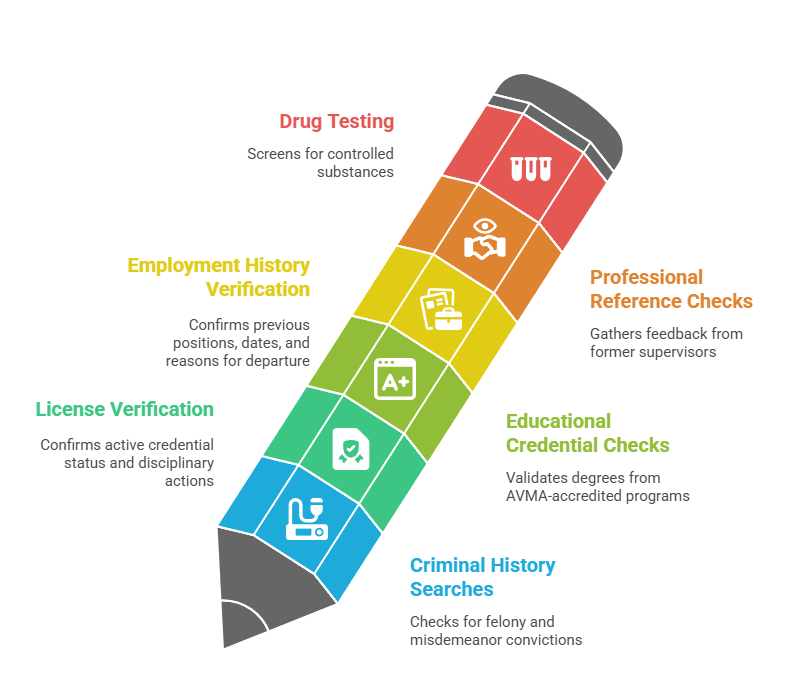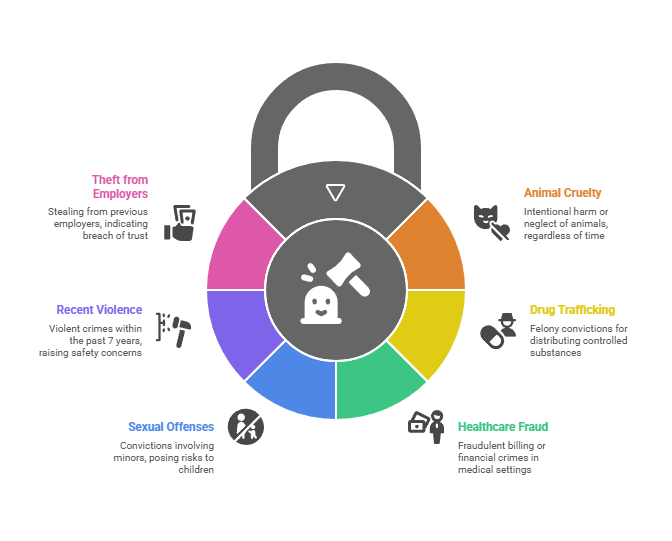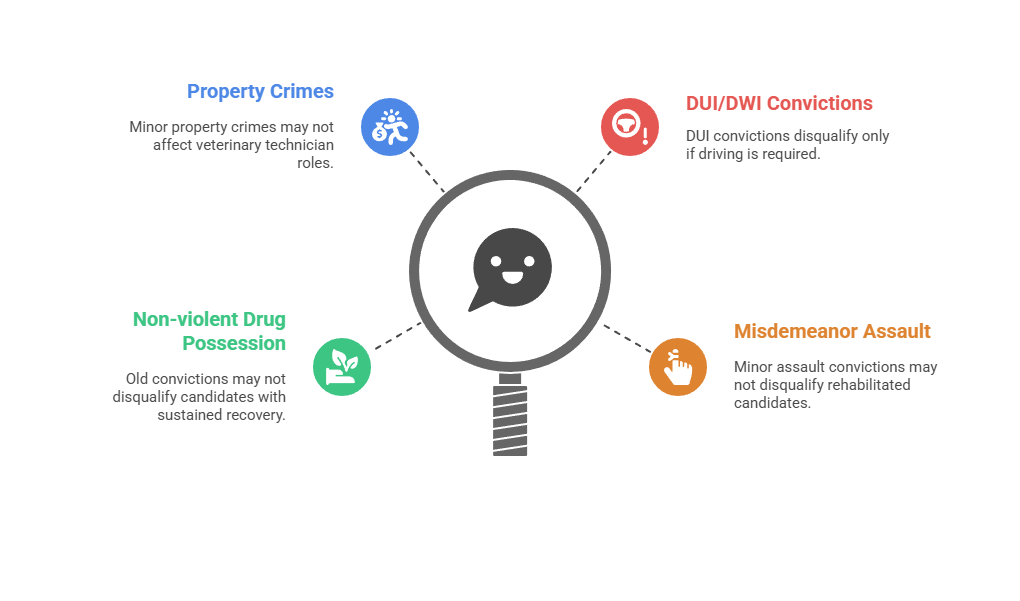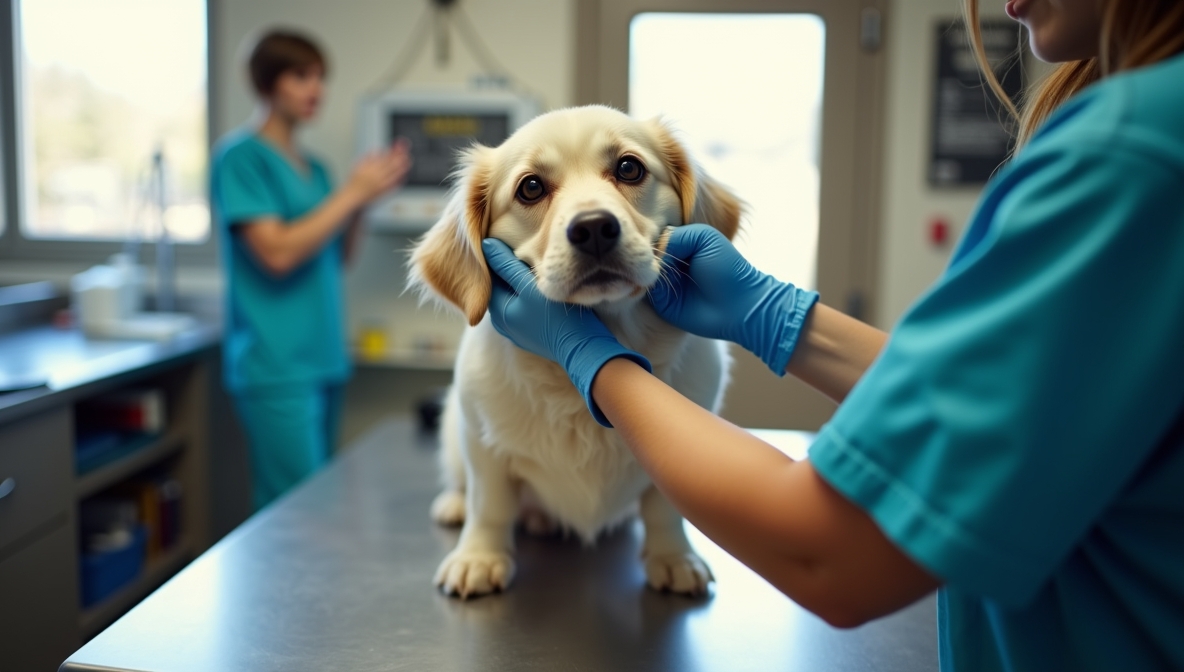Veterinary technician background check requirements vary significantly across states, with some jurisdictions mandating FBI fingerprinting and comprehensive criminal history reviews while others maintain minimal screening standards, creating a complex compliance landscape for veterinary practices. As of 2025, veterinary employers face increasing liability risks related to controlled substance handling and animal welfare, making thorough background screening not just a regulatory obligation but a critical component of risk management and public trust.
Key Takeaways
- State-specific vet tech background check requirements range from mandatory FBI fingerprinting in states like California and Texas to voluntary screening in jurisdictions without formal credentialing programs.
- Veterinary practices with DEA registration for controlled substances face heightened scrutiny and legal liability, making comprehensive employee background screening essential regardless of state mandates.
- Criminal history disqualifiers typically include felony convictions related to animal cruelty, drug offenses, fraud, and violent crimes, though specific prohibitions vary by state licensing boards.
- The average veterinary technician background check costs between $50-150 per candidate and takes 3-10 business days, with fingerprint-based FBI checks adding additional time and expense.
- Twelve states now require credentialed veterinary technicians to undergo state-level background checks as part of initial licensure or registration, with several more states considering similar legislation in 2025.
- FCRA compliance is mandatory for all veterinary employers conducting background checks, requiring proper disclosure, candidate authorization, and adverse action procedures when denying employment.
- Multi-state veterinary practices must navigate varying requirements across jurisdictions, often necessitating standardized screening protocols that meet the most stringent state's requirements.
- Regular re-screening of existing veterinary staff (typically every 2-3 years) is becoming a best practice for clinics handling controlled substances and vulnerable patient populations.
Understanding Veterinary Technician Background Check Requirements
The veterinary healthcare industry occupies a unique regulatory space where state-by-state credentialing requirements intersect with federal controlled substance regulations and animal welfare statutes. Unlike human healthcare, where background screening standards have achieved relative uniformity, veterinary technician background verification requirements remain fragmented.
As of 2025, veterinary technician credentialing falls into three primary categories: states with mandatory licensure requiring background checks, states with voluntary registration or certification that may include screening, and states with no formal credentialing system. This patchwork creates significant compliance complexity for veterinary practice owners.
The Regulatory Landscape for Veterinary Employment Screening
States with mandatory veterinary technician licensure typically require criminal background checks as part of the initial application process. These background investigations often include fingerprint-based FBI checks that search national criminal databases, providing a comprehensive view of an applicant's history across state lines.
California, Texas, Florida, and New York represent examples of states with robust screening requirements integrated into their credentialing programs. Each state maintains unique disqualifying criteria and review processes.
Federal Requirements and DEA Considerations
While state requirements vary, federal regulations create a baseline standard for veterinary practices registered with the Drug Enforcement Administration. DEA registration doesn't explicitly mandate employee background checks, but the agency's expectation of "responsible handling" and the legal liability associated with diversion create a de facto requirement for thorough vetting.
Veterinary practices maintaining Schedule II-V controlled substances face potential penalties including loss of DEA registration, civil fines exceeding $25,000 per violation, and criminal prosecution. This regulatory environment has driven 73% of veterinary practices to implement comprehensive background screening programs even in states without explicit mandates, according to 2024 industry surveys.
Animal Welfare and Liability Considerations
Beyond controlled substance concerns, veterinary employers face unique liability exposure related to animal welfare and public safety. Several high-profile cases in 2023-2024 involving veterinary staff with undisclosed animal cruelty convictions have prompted legislative action in multiple states.
The American Veterinary Medical Association (AVMA) now recommends comprehensive background checks for all veterinary team members with animal contact or access to client information, regardless of state mandates. This reflects growing recognition that veterinary practices operate as specialized healthcare facilities where employee integrity directly impacts patient safety.
EXPERT INSIGHT: In the vet world, background checks are never about questioning others but about protecting the animals and customers who put their absolute trust in us. Veterinary technicians work with controlled drugs, calm nervous pet owners, and care for patients who can’t speak for themselves if something doesn’t look right. That’s just one of the many reasons why a fair and comprehensive background check means so much to me. Our clinics are protected, our staff is retained, and our profession is honored because of it. - Charm Paz, CHRP
State-by-State Background Check Requirements Comparison
Understanding specific state requirements represents the first step in developing compliant hiring procedures. Requirements vary dramatically across jurisdictions. The following table provides a comprehensive comparison of credentialing and screening requirements by state.
| State | Credentialing Type | Background Check Required | Fingerprinting Required | Key Disqualifying Offenses |
| California | Mandatory License (RVT) | Yes | Yes (Live Scan) | Animal cruelty, controlled substance violations (7 years), fraud |
| Texas | Mandatory License (LVT) | Yes | Yes (FBI) | Animal cruelty, recent drug offenses, moral turpitude crimes |
| Florida | Mandatory License | Yes | Yes (FDLE/FBI) | Animal cruelty, domestic violence, stalking, drug offenses |
| New York | Mandatory License | Yes | Yes (FBI) | Animal cruelty, felony convictions, controlled substance violations |
| Pennsylvania | Mandatory License | Yes | Yes (state) | Animal abuse, drug offenses, fraud convictions |
| Illinois | Mandatory License | Yes | No | Animal cruelty, felony convictions related to practice |
| Ohio | Mandatory Registration | Yes | No | Animal cruelty, drug offenses within 5 years |
| Washington | Mandatory License | Yes | Yes (FBI) | Animal cruelty, controlled substance crimes, violence |
| Oregon | Mandatory License | Yes | No | Animal abuse, drug crimes, dishonesty offenses |
| Colorado | Mandatory Registration | Yes | No | Animal cruelty, recent felonies, fraud |
| North Carolina | Mandatory License | Yes | No | Animal abuse, drug offenses, violent crimes |
| Virginia | Mandatory Registration | Yes | No | Animal cruelty, controlled substance violations |
This table represents current requirements as of 2025. States frequently update their credentialing and screening requirements. Practice managers should verify current requirements with their state veterinary medical board.
States with Mandatory Background Checks
Twelve states currently mandate criminal background checks as part of veterinary technician licensure or registration processes. These states integrate background screening into their credentialing programs, typically requiring fingerprints for FBI database searches and state criminal history reviews.
California requires all Registered Veterinary Technicians (RVTs) to undergo Live Scan fingerprinting through the California Department of Justice and FBI. Disqualifying offenses include animal cruelty convictions, controlled substance violations within the past seven years, and felonies involving dishonesty or fraud. The board reviews criminal histories on a case-by-case basis.
Texas mandates background checks for Licensed Veterinary Technicians through the Texas Board of Veterinary Medical Examiners, including fingerprint-based FBI checks. Texas maintains specific disqualifying criteria including animal cruelty convictions, recent drug offenses, and crimes involving moral turpitude.
States with Voluntary or No Credentialing
Approximately twenty states maintain voluntary veterinary technician registration or certification programs that encourage but don't mandate background checks. In these jurisdictions, individual employers bear primary responsibility for comprehensive background verification.
The remaining states lack formal veterinary technician credentialing programs, placing full responsibility for background screening on individual employers. Veterinary employers in these states should note that absence of state requirements doesn't eliminate liability exposure.
Essential Components of Veterinary Practice Background Screening
Comprehensive veterinary technician background verification extends beyond basic criminal history checks. Multiple verification components together provide employers with a complete picture of candidate suitability.
Most effective screening programs include the following core elements:

- Criminal history searches: County-level, state, and national database checks revealing felony and misdemeanor convictions
- License verification: Confirmation of active credential status and review of disciplinary actions
- Educational credential checks: Validation of degrees from AVMA-accredited programs
- Employment history verification: Confirmation of previous positions, dates, and reasons for departure
- Professional reference checks: Direct feedback from former supervisors about performance and conduct
- Drug testing: Pre-employment screening for controlled substances, particularly opioids and benzodiazepines
These components work together to create a comprehensive risk assessment. Each element reveals different aspects of candidate suitability and potential liability concerns.
Criminal History Searches and Database Checks
Criminal background checks form the foundation of veterinary employment screening. County-level criminal searches provide the most accurate and current information but require searching each jurisdiction where the candidate has lived. State criminal databases offer broader geographic coverage but may contain incomplete or outdated information.
National criminal database searches serve as valuable supplementary tools but shouldn't constitute the sole criminal screening component. FBI fingerprint-based checks provide the most comprehensive criminal history coverage, searching national databases maintained by the FBI. However, these checks require state authorization and cost $50-75 per search.
License and Credential Verification
Verifying veterinary technician licenses and educational credentials represents a critical screening component. Studies indicate that 12-15% of veterinary technician applicants provide inaccurate or misleading credential information, whether through innocent error or intentional fraud.
License verification should include confirmation of current active status and review of any disciplinary actions or restrictions. Educational verification becomes particularly important for candidates claiming graduation from unaccredited veterinary technology programs or foreign institutions.
Criminal History Disqualifying Factors
Understanding which criminal convictions should disqualify veterinary technician candidates remains one of the most challenging aspects of employment screening. Federal EEOC guidance prohibits blanket policies that automatically reject all candidates with criminal records. Instead, employers must conduct individualized assessments considering the nature and gravity of the offense, time elapsed since conviction, and relationship between the conviction and job responsibilities.
Absolute Disqualifiers for Veterinary Technician Positions
The following criminal convictions typically result in automatic disqualification from veterinary technician positions due to direct relevance to core job responsibilities:

- Animal cruelty or neglect convictions: Any conviction involving intentional harm, abuse, or neglect of animals represents an absolute disqualifier regardless of how long ago it occurred
- Controlled substance trafficking or distribution: Felony drug distribution convictions indicate high risk for diversion of veterinary controlled substances
- Healthcare fraud or insurance fraud: Convictions involving fraudulent billing or healthcare-related financial crimes demonstrate dishonesty in medical settings
- Sexual offenses involving minors: These convictions create unacceptable risks in settings where minor children frequently visit with family pets
- Recent violent felonies: Convictions for assault, domestic violence, or other violent crimes within the past 7 years raise workplace safety concerns
- Theft or embezzlement from employers: Convictions for stealing from previous employers demonstrate breach of trust incompatible with veterinary practice operations
State licensing boards in jurisdictions with mandatory credentialing typically specify these categories as automatic disqualifiers. Individual practices should adopt similar standards even in states without formal credentialing requirements.
Situational Disqualifiers Requiring Individualized Assessment
Certain criminal convictions require case-by-case evaluation rather than automatic disqualification:

- Non-violent drug possession offenses: Simple possession convictions more than 5-7 years old may not disqualify candidates who demonstrate sustained recovery
- Property crimes unrelated to employment: Convictions for criminal mischief or minor property damage may not relate to veterinary technician responsibilities if sufficient time has elapsed
- DUI/DWI convictions: Driving under the influence convictions typically don't disqualify candidates unless the position requires driving clinic vehicles
- Misdemeanor assault: Minor assault convictions stemming from isolated incidents more than 5 years ago may not disqualify candidates who demonstrate rehabilitation
For these situational disqualifiers, employers should document their individualized assessment process. This documentation protects against discrimination claims while allowing flexibility to hire qualified candidates with minor or dated convictions.
FCRA Compliance for Veterinary Employers

The Fair Credit Reporting Act establishes strict requirements for employers conducting background checks through third-party screening companies. Veterinary practices using consumer reporting agencies for employment screening must understand and implement FCRA-compliant procedures to avoid legal liability.
Required Disclosures and Authorization Procedures
FCRA requires employers to provide candidates with clear, standalone disclosure before conducting background checks. This disclosure must appear on a separate document containing only the disclosure and related information about the screening process.
Following disclosure, employers must obtain written authorization from candidates before initiating background checks. Many veterinary practices violate FCRA requirements by including liability waivers or binding arbitration clauses in their disclosure documents. Recent enforcement actions have resulted in six-figure settlements for violations.
Adverse Action Procedures When Denying Employment
When background check results prompt a decision to deny employment, FCRA mandates a specific adverse action process. Veterinary employers must provide pre-adverse action notice including a copy of the background check report, then wait a reasonable period (typically 5 business days) before finalizing the employment decision.
After the waiting period, employers must provide a final adverse action notice identifying the screening company and informing the candidate of their right to dispute report accuracy. State-specific requirements often supplement FCRA obligations, with states like California, New York, and Washington imposing additional disclosure requirements and extended waiting periods.
Ban-the-Box Laws and Fair Chance Hiring Requirements
Recent legislative trends have significantly restricted how employers can consider criminal history. Fifteen states and over thirty cities have enacted "ban-the-box" laws prohibiting employers from inquiring about criminal history on initial job applications.
California's Fair Chance Act prohibits employers with five or more employees from asking about criminal history until after making a conditional job offer. The law also mandates specific procedures for considering criminal history and provides candidates with dispute rights when criminal history prompts adverse action.
Other states with significant ban-the-box restrictions include New York, Illinois, Washington, Oregon, New Jersey, and Massachusetts. Veterinary practices operating in these jurisdictions must carefully sequence their hiring processes to comply with criminal history inquiry restrictions.
Individualized Assessment Best Practices
EEOC guidance requires individualized assessment of criminal history that considers multiple factors. For veterinary positions, relevant considerations include whether convictions relate to animal welfare, controlled substance handling, client interaction, or financial responsibilities.
Documentation should identify the specific concerns raised by criminal history, explain why those concerns relate to essential job functions, and describe what evidence might mitigate disqualification. This detailed record-keeping demonstrates that employment decisions result from thoughtful analysis rather than blanket policies.
Building a Compliant Veterinary Background Check Program
Developing comprehensive, compliant background screening procedures requires veterinary practices to integrate multiple requirements into cohesive policies.
Selecting Background Screening Vendors
Veterinary practices should select consumer reporting agencies with specific experience in healthcare or veterinary industry screening. Vendor evaluation should assess:
- Search comprehensiveness: Verify that criminal searches include county-level, state, and national database checks
- Turnaround time: Confirm typical completion timeframes align with hiring process needs
- Accuracy guarantees: Review the vendor's dispute resolution processes
- Compliance support: Assess whether the vendor provides FCRA disclosure forms and adverse action letters
- Customer service quality: Test responsiveness through pre-contract interactions
Cost considerations typically range from $50-150 per comprehensive screening package. Volume discounts may be available for larger practices conducting multiple screenings monthly.
Developing Position-Specific Screening Protocols
Not all veterinary positions warrant identical screening intensity. Credentialed veterinary technicians with controlled substance access require the most comprehensive screening. Veterinary assistants and kennel staff without controlled substance access may require less intensive screening, though criminal history checks focusing on animal welfare remain essential.
Documentation and Record Retention Requirements
FCRA requires employers to retain background check records for five years from the screening date or duration of employment plus one year, whichever is longer. Background check records contain sensitive personal information requiring secure storage, limited access, and proper disposal procedures.
Cost Analysis and Implementation Timeline
Understanding the financial and time investments required for comprehensive veterinary background screening helps practice managers budget appropriately.
| Screening Component | Typical Cost | Typical Timeline |
| County criminal search (per county) | $15-30 | 3-5 business days |
| State criminal database | $10-20 | 1-2 business days |
| National criminal database | $10-25 | 1-2 business days |
| FBI fingerprint check | $50-75 | 3-5 days (electronic) / 8-12 weeks (paper) |
| License verification | $15-25 | 2-3 business days |
| Educational verification | $15-25 | 2-10 business days |
| Employment verification (per employer) | $20-40 | 3-7 business days |
| Drug testing (10-panel) | $50-75 | 1-3 business days |
Comprehensive background screening packages typically complete within 5-7 business days under normal circumstances. Veterinary practices should communicate realistic timeline expectations to candidates and avoid premature job offers or start dates before screening completion.
Conclusion
Veterinary technician background check requirements reflect a complex intersection of state credentialing regulations, federal controlled substance requirements, and professional liability considerations. As of 2025, the trend toward mandatory background screening continues to accelerate, driven by legislative responses to high-profile misconduct cases. Veterinary practices that implement comprehensive, compliant screening programs position themselves to meet current regulatory requirements while addressing evolving client expectations. By understanding state-specific requirements, maintaining FCRA compliance, and building position-appropriate screening protocols, veterinary employers can effectively balance compliance obligations with efficient hiring practices.
Frequently Asked Questions
Below are answers to the most common questions veterinary employers and vet tech candidates ask about background checks. These FAQs break down what gets reviewed, how long screenings take, what may disqualify someone, and how veterinary requirements differ from other healthcare roles.
What does a background check show for veterinary technicians?
Veterinary technician background checks typically reveal criminal history including felony and misdemeanor convictions, license status and disciplinary actions, educational credential verification, employment history validation, and drug test results. Most veterinary employers focus particularly on convictions related to animal cruelty, controlled substance offenses, fraud, theft, and violent crimes due to their relevance to veterinary practice responsibilities.
How far back do veterinary background checks go?
Most veterinary background checks review criminal history for seven years, aligning with Fair Credit Reporting Act standards, though felony convictions typically appear indefinitely. State-specific requirements may mandate longer lookback periods, with some jurisdictions requiring review of complete adult criminal history for credentialed positions.
Can you be a vet tech with a criminal record?
Having a criminal record doesn't automatically disqualify candidates from veterinary technician positions, but specific convictions may create barriers depending on state credentialing requirements. States with mandatory licensure typically specify disqualifying offenses including animal cruelty, recent controlled substance violations, and crimes involving moral turpitude, though many boards conduct individualized assessments.
Do veterinary clinics require drug testing?
Approximately 68% of veterinary practices conduct pre-employment drug testing as of 2024, with the percentage significantly higher among practices registered with the DEA to handle controlled substances. Many practices implement both pre-employment testing and random screening programs for employees with controlled substance access.
How much do veterinary background checks cost?
Comprehensive veterinary technician background checks typically cost between $50-150 per candidate depending on screening components. Basic packages fall at the lower end, while expanded screenings adding employment verification, education confirmation, and drug testing reach the higher range. FBI fingerprint-based checks add $50-75 to total costs.
What disqualifies you from becoming a veterinary technician?
Common disqualifying factors include felony convictions for animal cruelty or neglect, recent controlled substance offenses (typically within 5-7 years), fraud or theft convictions particularly related to healthcare, and violent crime convictions. Most state licensing boards conduct individualized assessments considering rehabilitation evidence, time elapsed since convictions, and specific job relevance.
How long does veterinary technician background screening take?
Standard veterinary background checks typically complete within 5-7 business days for comprehensive packages. States requiring FBI fingerprint-based checks add 3-5 business days for electronic submissions or 8-12 weeks for paper-based processing.
Are veterinary background checks different from other healthcare background checks?
Veterinary background checks share similarities with human healthcare screening but reflect unique considerations around animal welfare and controlled substance access. Veterinary-specific screening emphasizes animal cruelty history and controlled substance diversion risks in ways that don't apply to human healthcare positions.
Additional Resources
- AVMA State Veterinary Practice Acts and Regulatory Information
https://www.avma.org/advocacy/state-local-issues/state-veterinary-practice-acts - EEOC Guidance on Consideration of Arrest and Conviction Records in Employment
https://www.eeoc.gov/laws/guidance/consideration-arrest-and-conviction-records-employment-decisions-under-title-vii - FTC Guidance on Using Consumer Reports for Employment Background Checks
https://www.ftc.gov/business-guidance/resources/using-consumer-reports-what-employers-need-know - DEA Practitioner's Manual: Information for Veterinarians
https://www.deadiversion.usdoj.gov/pubs/manuals/pract/index.html - NAVTA Guide to Veterinary Technician Credentialing by State
https://www.navta.net/page/credentialing
Still have questions?
Get in touch with our team today for a personalized demo and discover how our tailored volume pricing and packages can drive results for your business!
How useful was this page?*
Note: your comments are anonymous. We use them to improve the website. Do not include any personal details.
Visit our FCRA Compliance Tool or leave a message here if you need a response.
From the blog Explore the GCheck Content Hub

How Long Do Background Checks Take for Government Jobs? Timeline Expectations for 2026
6 Jan, 2026 • 20 min read
Driver Qualification File Requirements: Your Complete DOT Compliance Guide
6 Jan, 2026 • 18 min read
Healthcare Background Screening Costs: 2026 Budget Planning Guide for Medical Facilities
30 Dec, 2025 • 23 min readThe information provided in this article is for general informational and educational purposes only and should not be construed as legal advice or a substitute for consultation with qualified legal counsel. While we strive to ensure accuracy, employment screening laws and regulations—including but not limited to the Fair Credit Reporting Act (FCRA), Equal Employment Opportunity Commission (EEOC) guidelines, state and local ban-the-box laws, industry-specific requirements, and other applicable federal, state, and local statutes—are subject to frequent changes, varying interpretations, and jurisdiction-specific applications that may affect their implementation in your organization. Employers and screening decision-makers are solely responsible for ensuring their background check policies, procedures, and practices comply with all applicable laws and regulations relevant to their specific industry, location, and circumstances. We strongly recommend consulting with qualified employment law attorneys and compliance professionals before making hiring, tenant screening, or other decisions based on background check information.


